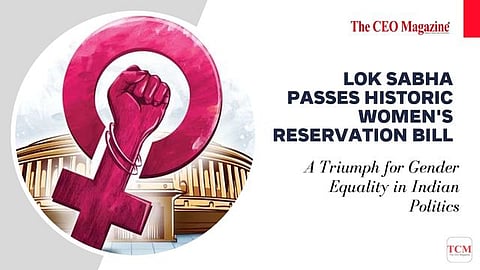
- News
- Women
- Magazine
- IndustryIndustry
- InsightsInsights
- Success Stories
- PublishPublish
- ContactContact
- Media KitMedia Kit

Lok Sabha Passes Historic Women's Reservation Bill
Opposition Calls for Inclusion of OBCs and Urgent Implementation as the Landmark Legislation Awaits Rajya Sabha Approval
New Delhi: In a momentous development, the Lok Sabha, under the leadership of Prime Minister Narendra Modi, has passed a historic bill that has been awaited for over two decades. On September 20, 2023, the Lok Sabha achieved near unanimity in supporting a bill aimed at amending the Constitution to provide one-third reservation for women in both the Lok Sabha and State Assemblies. This legislation, which marks a significant step towards gender equality in Indian politics, now awaits approval from the Rajya Sabha and, potentially, half of the states.
The journey of the Women's Reservation Bill began twenty-seven years ago when it was first introduced in Parliament. Despite several attempts over the years, it faced numerous obstacles in becoming law. However, on this historic day, the Lok Sabha displayed remarkable unity, with 454 members supporting the Constitution (One Hundred and Twenty-Eighth) Bill 2023, satisfying the constitutional requirement of "two-thirds majority of the members present and voting." Only two members, Asaduddin Owaisi and Syed Imtiyaz Jaleel of the All India Majlis-E-Ittehadul Muslimeen, opposed the bill.
Prime Minister Narendra Modi hailed this momentous occasion as a "historic legislation" that would empower women and enhance their participation in the political process. In a statement on social media, he expressed gratitude to the Lok Sabha members for their support.
While the bill's passage is indeed a significant achievement, it did not come without its share of debates and demands from the opposition. Some opposition members called for the bill to be delinked from delimitation, a process that redraws constituency boundaries. They also urged for the inclusion of a quota within the quota for Other Backward Classes (OBCs).
The bill will now proceed to the Rajya Sabha for further consideration during the remaining days of the Special Session of Parliament. Additionally, it may require approval from at least half of the states, which will be a crucial step toward its enactment.
One key aspect to consider is the timeline for implementation. The women's reservation can only be put into effect after the first delimitation of constituencies following the bill's passage. This is anticipated to occur in 2027 since delimitation typically takes place after the next census. Therefore, the bill may not become operational until 2029.
The potential delay in implementation has spurred demands from the opposition for immediate action. They have called for the bill's swift enactment and have pressed for a sub-quota to be established for OBCs. Opposition leaders, including Congress parliamentary party chief Sonia Gandhi and Rahul Gandhi, expressed their concerns about further postponing women's participation in politics. They argued that waiting for several more years would be detrimental to the cause of gender equality.
Union Home Minister Amit Shah, while addressing the concerns raised by the opposition, explained that both delimitation and the census would commence after the next general election. He emphasised the need to rise above partisan politics and pass the bill unanimously, highlighting the disappointment faced by women in previous attempts to enact such legislation.
The passage of the Women's Reservation Bill in the Lok Sabha is undeniably a momentous achievement in India's political landscape. It reflects a significant stride towards gender equality, which has long been awaited. While the bill faces further legislative hurdles, its approval in the Lok Sabha signifies a crucial step forward. The coming days and weeks will be pivotal as the Rajya Sabha and states deliberate on this historic legislation, which promises to empower and involve women more substantially in Indian politics.
Follow us on Google News
